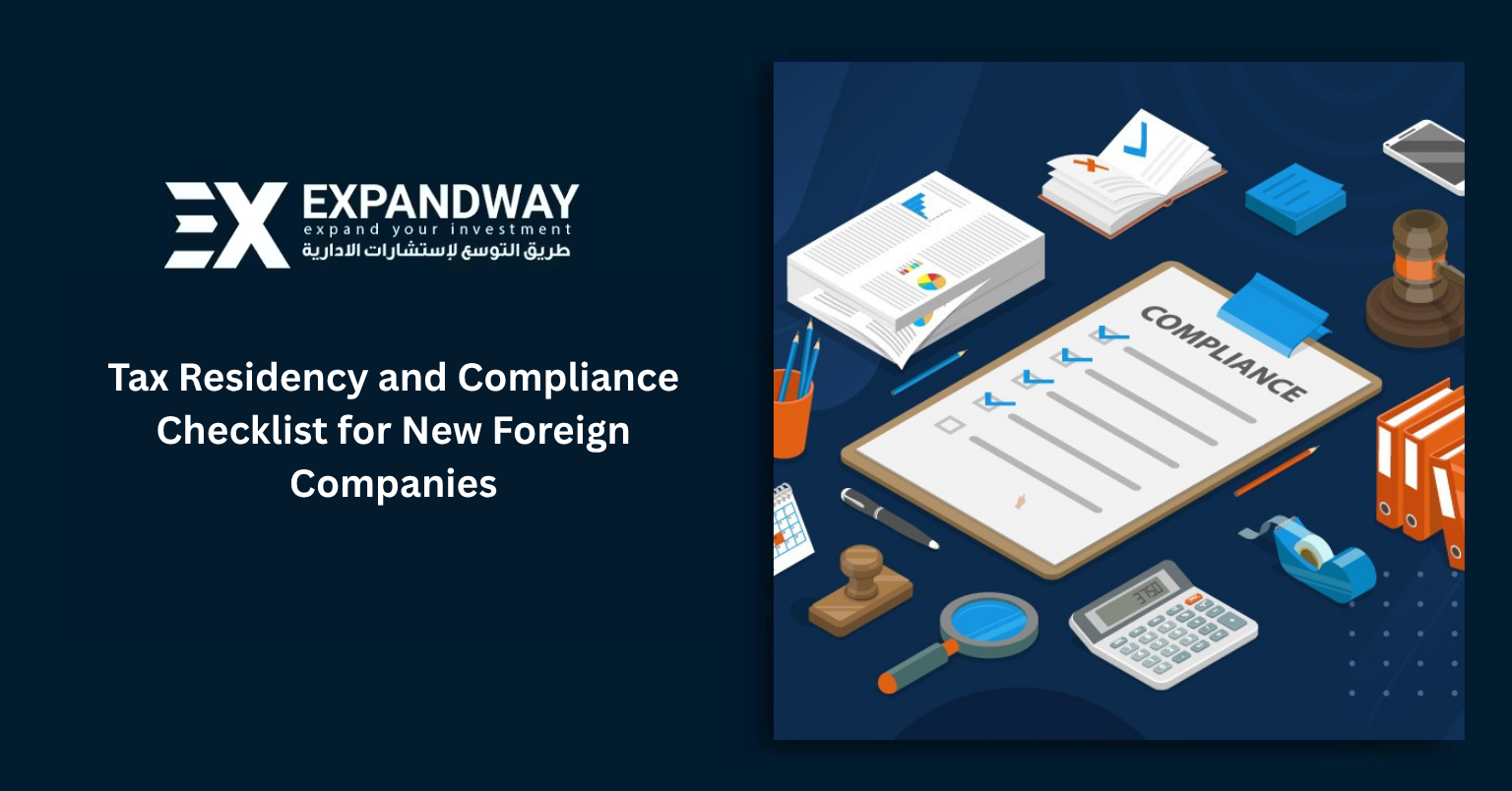Starting a foreign-owned company in Saudi Arabia offers lucrative opportunities, but understanding tax residency Saudi Arabia requirements is essential for staying compliant with the Kingdom’s strict tax and regulatory laws; from corporate income tax and VAT registration to e-invoicing and payroll reporting, new entities must follow structured procedures to remain compliant.
- What Is Tax Residency in Saudi Arabia?
- Tax Residency & Company Registration Requirements
- Corporate Income Tax (CIT) Requirements
- VAT Registration Requirements
- Double Tax Treaty Benefits
- Why Compliance Matters in Saudi Arabia (2025)
- Conclusion: Stay Fully Compliant for Long-Term Success
- Call to Action
What Is Tax Residency in Saudi Arabia?
A company is considered tax resident in Saudi Arabia when:
- It has foreign ownership in a Saudi entity, or
- It operates a Permanent Establishment (PE) such as a branch, office, warehouse, or management activity inside Saudi Arabia.
Foreign-owned shares are subject to Corporate Income Tax (CIT), while Saudi-owned shares are subject to Zakat.
Tax Residency & Company Registration Requirements
1. Obtain Commercial Registration (CR)
Issued by the Ministry of Commerce, the CR legally authorizes the company to operate in the Saudi market.
2. Register with ZATCA
All foreign companies must register with the Zakat, Tax and Customs Authority (ZATCA) within 30 days of becoming liable.
You must prepare:
- CR certificate
- Articles of Association
- Shareholder details
- Financial records
- Authorized signatory information
Timely registration prevents penalties and delays.
Corporate Income Tax (CIT) Requirements
Foreign-owned companies are subject to:
20% CIT on Adjusted Profits
This standard rate applies to all foreign shareholders’ portions.
Annual Audited Financial Statements
Companies must file annual CIT returns supported by audited financial statements prepared under IFRS or Saudi GAAP.
Mandatory E-Invoicing (Fatoora)
Saudi Arabia mandates e-invoicing for all taxable transactions.
Invoices must include:
- QR code
- TIN
- Invoice details
- VAT breakdown (if applicable)
Payroll & GOSI Compliance
Employee salary records must match reporting submitted to the General Organization for Social Insurance (GOSI).
Withholding Tax (WHT)
Payments to non-resident suppliers require WHT deductions and monthly filings.
Rates vary based on the type of service and treaty agreements.
VAT Registration Requirements
Foreign companies must register for VAT if:
- Annual taxable turnover exceeds SAR 375,000, OR
- Expected turnover will exceed the threshold within 12 months.
Required documents for VAT registration:
- CR
- Tax Identification Number (TIN)
- Articles of Association
- Bank account details
- Owner/Manager ID documents
After registration, companies must file periodic VAT returns and maintain compliant records for at least 5 years.
Double Tax Treaty Benefits
Saudi Arabia has multiple double taxation treaties with other countries.
To claim relief, companies must submit:
- A valid Tax Residency Certificate from their home country
- Evidence of economic activity
- Proper documentation supporting treaty benefits
Incorrect documentation may lead to higher withholding tax rates.
Additional Compliance Requirements
FATCA & CRS Reporting
All relevant entities must comply with international reporting standards, including:
- FATCA for U.S.-related persons
- CRS for international tax transparency
Invoice Compliance
Invoices must include:
- Buyer & seller details
- TIN
- Date & description
- Fatoora-compliant QR code
Penalties for Non-Compliance
Non-compliance may result in:
- Financial penalties
- Suspension of corporate services
- Banking delays
- Inability to renew licenses
- Operational blocks until rectified
Complete 2025 Compliance Checklist
Registration
- Obtain Commercial Registration (CR)
- Register with ZATCA within 30 days
- Determine tax residency status
Corporate Income Tax
- Maintain accurate accounts
- Conduct annual financial audits
- File CIT returns annually
- Implement Fatoora e-invoicing
- Maintain GOSI-aligned payroll
VAT
- Register for VAT (if required)
- File VAT returns on time
- Keep VAT records for 5 years
Withholding Tax
- Identify non-resident payments
- Apply WHT deductions
- File monthly WHT reports
Regulatory Reporting
- Comply with FATCA/CRS
- Submit Tax Residency Certificates for treaty benefits
Why Compliance Matters in Saudi Arabia (2025)
Saudi Arabia is rapidly modernizing its economy under Vision 2030.
The government has strengthened regulatory systems to:
- Improve transparency
- Protect investors
- Enhance tax collection efficiency
- Align with global standards (OECD, international treaties)
- Support the growing influx of foreign businesses
Proper compliance ensures smooth operations, fast government approvals, and avoided penalties.
Conclusion: Stay Fully Compliant for Long-Term Success
Foreign companies entering Saudi Arabia must follow a structured and transparent compliance framework. By adhering to this comprehensive checklist, you ensure:
- A smooth business setup
- No penalties or operational restrictions
- Compliance with all tax and regulatory obligations
- Eligibility for double tax treaty benefits
- Long-term business stability in the Kingdom
If you need help with tax registration, VAT setup, or compliance audits, speak to a Saudi business formation expert today.
Call to Action
Ready to expand into Saudi Arabia?
Get expert help with company formation, ZATCA registration, VAT, payroll, and full compliance.
👉 Book a Consultation

